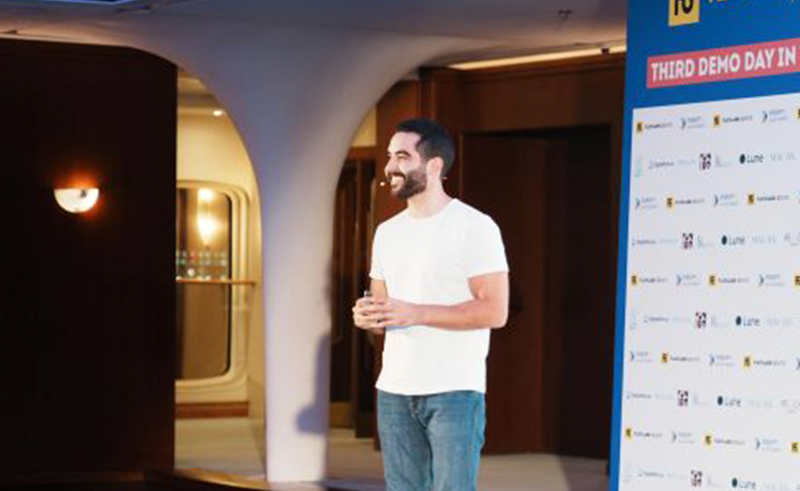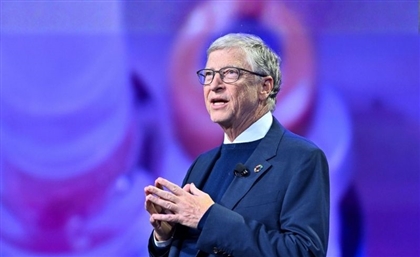Masterclass With Co-Founder of MAKAN Youssef Sekkat
Youssef Sekkat, Co-Founder of MAKAN, shares his views on how young entrepreneurs can impact climate action.

StartupScene’s op-ed series ‘Masterclass’ invites some of the region’s most dynamic entrepreneurs to divulge their secrets, dispense their knowledge, and share their experiences with the MENA region’s ever-growing startup ecosystem. Whether they’re written by old guards or trailblazers, these masterclasses have been created to illuminate the path for aspiring entrepreneurs.
This month’s Masterclass contributor is Youssef Sekkat, Co-Founder of MAKAN, a UAE-based rental service platform for furniture. Sekkat shares his views on how young entrepreneurs can impact climate action by drawing on his own experience, and on the broader landscape of innovation and eco-conscious business models.
Young Minds, Big Impact: Youth Entrepreneurship as a Catalyst for Climate Action
-e2ba2907-c9ac-4a5c-8863-9ac065fdb68c.png)
While COP28 may have taken place late last year in Dubai, the global conversation around climate change is still very much present. The gathering provided a unique stage to explore the multifaceted role of youth entrepreneurship in spearheading sustainable solutions. At MAKAN, our experience in building a business grounded in the principles of a circular economy offers just one glimpse into the myriad ways young entrepreneurs are contributing to a greener future.
Established in the UAE, the startup aims to align the principles of sustainability with the demands of modern living by redefining what it means to own furniture. With a furniture as a service business model, we offer a convenient solution for customers to furnish their homes, allowing them to pay for their furniture on a monthly basis and providing the flexibility to return these items upon moving.
Since launching in 2021, we have saved thousands of tons of furniture from landfills. This has translated to a reduction of over 200 tons of CO2 emissions - the equivalent of driving a car for nearly a million kilometres. These figures are not just numbers; they represent our commitment to making a tangible, positive impact on the planet.
The Urgency of Addressing Climate Change: A Youth-Driven Response
 The climate crisis presents a challenge unlike any other in human history, and it is the younger generation that is most acutely aware of its implications. Growing up in an era marked by climate change, young people are not only witnessing its impacts but also understanding that they will be the ones grappling with its consequences in the future. This awareness has galvanized a global youth movement, taking matters into their own hands to demand and drive change.
The climate crisis presents a challenge unlike any other in human history, and it is the younger generation that is most acutely aware of its implications. Growing up in an era marked by climate change, young people are not only witnessing its impacts but also understanding that they will be the ones grappling with its consequences in the future. This awareness has galvanized a global youth movement, taking matters into their own hands to demand and drive change.
This proactive stance is embodied by figures like Greta Thunberg, whose school strike evolved into a global climate action movement. Thunberg's efforts exemplify how young voices are not only influential in raising awareness but also instrumental in driving tangible change.
 In this context, youth entrepreneurs are stepping forward as leaders of change. They are not just passive observers but active participants, leveraging their skills, innovation, and passion to create sustainable solutions. They are also inspired by historical figures who have been pivotal in pioneering significant advancements. Steve Jobs and Steve Wozniak were both in their early 20s when they laid the groundwork for the personal computing revolution with the founding of Apple. In a similar vein, Elon Musk embarked on his entrepreneurial journey at the age of 24 and has since risen to become one of the world's most influential entrepreneurs. These examples from the past underscore the profound impact that young innovators can have, often acting as catalysts for societal transformation.
In this context, youth entrepreneurs are stepping forward as leaders of change. They are not just passive observers but active participants, leveraging their skills, innovation, and passion to create sustainable solutions. They are also inspired by historical figures who have been pivotal in pioneering significant advancements. Steve Jobs and Steve Wozniak were both in their early 20s when they laid the groundwork for the personal computing revolution with the founding of Apple. In a similar vein, Elon Musk embarked on his entrepreneurial journey at the age of 24 and has since risen to become one of the world's most influential entrepreneurs. These examples from the past underscore the profound impact that young innovators can have, often acting as catalysts for societal transformation.
From renewable energy startups to sustainable agriculture initiatives, young entrepreneurs are crafting business models that balance economic success with environmental stewardship. In tackling climate change, the role of youth – as both activists and entrepreneurs – is indispensable. They are not waiting for the future; they are actively forging a path towards a more sustainable and resilient world.
Case Study: MAKAN's Journey
 The genesis of MAKAN was deeply personal. Before launching MAKAN, I moved eight times in 10 years, never spending more than two years in the same place. The hassle of moving was one thing, but the sustainability aspect was another. I observed a disturbing trend: a significant portion of furniture ends up in landfills when moving out. In the US alone, 12 million tons of furniture are thrown out every year, making it the second largest contributor to landfill waste. This personal experience laid the foundation for MAKAN, driven by a dual mission: to make it easy for people to create their dream home and to infuse sustainability into every aspect of that process.
The genesis of MAKAN was deeply personal. Before launching MAKAN, I moved eight times in 10 years, never spending more than two years in the same place. The hassle of moving was one thing, but the sustainability aspect was another. I observed a disturbing trend: a significant portion of furniture ends up in landfills when moving out. In the US alone, 12 million tons of furniture are thrown out every year, making it the second largest contributor to landfill waste. This personal experience laid the foundation for MAKAN, driven by a dual mission: to make it easy for people to create their dream home and to infuse sustainability into every aspect of that process.
At the core of MAKAN’s innovative approach is the circular economy model, a transformative concept that reimagines the traditional linear 'take-make-dispose' methodology. This model isn't just an environmental imperative; it's a robust business strategy that melds economic resilience with growth opportunities.
In the furniture industry, inefficiencies and waste are rampant. At MAKAN, we challenge these norms by rethinking product design, usage, and recycling processes. We're committed to a system that places sustainability at its heart, from sourcing eco-friendly materials and working with local suppliers to offering furniture rental and refurbishment services. This approach not only maximizes resource efficiency but also significantly minimizes environmental impact. Crucially, the circular economy model also enables us to offer high-quality products at more accessible prices. By giving furniture a second life, we align our economic model with sustainability goals, making quality living spaces attainable for a broader audience.
This model represents a significant shift in production and consumption paradigms. It necessitates innovation not only in products but also in business models, supply chains, and consumer behavior. Leading a company based on these principles, we have experienced the challenges and triumphs of this transition. It demands long-term thinking, a readiness to challenge the status quo, and a commitment to sustainable results.
An example of this is the key challenge we faced in the early days, to find suppliers whose products aligned with our circular model. We were committed to finding items that were not only stylish and durable but also refurbishable. This journey took us to over 100 local suppliers, a testament to our dedication to quality and sustainability. Each piece of furniture in our catalog is chosen with the intent to live multiple lives, reducing waste and conserving resources.
Our story is one of relentless pursuit of a sustainable future, driven by personal experiences and a deep understanding of the environmental challenges we face. We see MAKAN as more than a business; it's a movement towards a more sustainable way of living, and a testament to what can be achieved when innovation meets environmental consciousness.
Supporting Youth Entrepreneurs
 The path of a young entrepreneur, especially in the climate sector, is however fraught with unique challenges and opportunities. To harness their full potential and ensure their innovative ideas come to fruition, a robust support system encompassing funding, mentorship, and favourable policies is essential.
The path of a young entrepreneur, especially in the climate sector, is however fraught with unique challenges and opportunities. To harness their full potential and ensure their innovative ideas come to fruition, a robust support system encompassing funding, mentorship, and favourable policies is essential.
Funding: The Lifeline of Startups: For young entrepreneurs, especially in the climate sector, access to capital is vital. It's the fuel that transforms innovative ideas into tangible, impactful solutions. The emergence of climate-oriented funds, mainly in the US and Europe, has been a game-changer, providing essential support to startups driving environmental innovation. For instance, Breakthrough Energy Ventures, founded by Bill Gates, and Amazon’s Climate Pledge Fund have set a precedent in supporting sustainable ventures. Similar initiatives can significantly accelerate the journey of climate-focused startups from concept to market, underscoring the growing global commitment to sustainable development.
The recent announcement of the AED 30 billion Climate Fund by the UAE is a commendable step. It's hoped that a portion of this fund will be allocated specifically towards young entrepreneurs and startups in the climate arena.
Mentorship – Guiding the Future Leaders: Mentorship is a cornerstone for nurturing young entrepreneurs, especially in fields as complex and vital as climate change. Experienced professionals from business, technology, and environmental sectors worldwide offer invaluable guidance, share insights, and help young innovators navigate the intricate business landscape.
For instance, in Europe, initiatives like Climate-KIC, Europe's largest public-private innovation partnership, offer mentorship programs focused on climate innovation. In Asia, organizations like the Hong Kong Science and Technology Parks Corporation provide various incubation programs, offering mentorship and support to startups in sustainability and clean energy.
These programs and incubators, spread across different continents, play a pivotal role in bridging the gap between young entrepreneurs and established veterans. Through mentorship, climate tech startups gain access to a wealth of knowledge and networks, enhancing their potential for success and impact in the fight against climate change.
 Favorable Policies – Catalyzing Startups in Diverse Geographies: Government policies globally have significantly influenced the growth of climate-focused startups. These region-specific policies have directly fostered the development and success of numerous green ventures.
Favorable Policies – Catalyzing Startups in Diverse Geographies: Government policies globally have significantly influenced the growth of climate-focused startups. These region-specific policies have directly fostered the development and success of numerous green ventures.
In the European Union, the Green Deal has spurred innovations like those from Solar Foods in Finland, a company revolutionizing sustainable food production. The United States has seen a surge in renewable energy startups, partly due to federal tax incentives. These policies have been instrumental for companies like Tesla, expanding its footprint in electric vehicles and solar energy. Singapore's focused policies have nurtured startups like Sembcorp, specializing in urban sustainable solutions.
These examples underscore the pivotal role of government policies in propelling climate-focused entrepreneurship, demonstrating how strategic support can accelerate innovation and sustainable development across the globe.
As we stand at the precipice of environmental calamity, it is imperative that we harness the energy, creativity, and entrepreneurial spirit of the youth to forge a path toward a sustainable future. Governments, businesses, and communities must unite in supporting and investing in youth entrepreneurship as a vehicle for climate action.
Let us inspire and empower young entrepreneurs to take bold steps towards climate solutions, knowing that their contributions are essential in shaping a world that values sustainability as much as it does economic growth. The journey of youth entrepreneurship in the context of climate change is not just about creating businesses; it's about crafting a legacy for a sustainable future. By supporting innovative thinking, sustainability, and entrepreneurship, we can turn the tide on climate change and build a world where economic prosperity and environmental health coexist in harmony.
- Previous Article Italian-Palestinian Duo No Input Debuts Eponymous Electro EP
- Next Article Travel Across History on Egypt's Most Iconic Bridges
Trending This Week
-
Dec 23, 2025



























